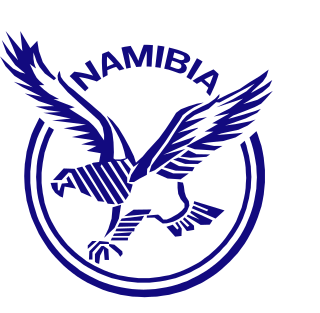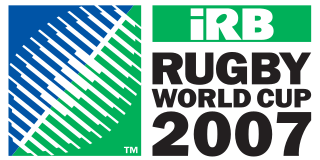
The Rugby World Cup is a men's rugby union tournament contested every four years between the top international teams. The tournament is administered by World Rugby, the sport's international governing body. The winners are awarded the Webb Ellis Cup, named after William Webb Ellis, who according to a popular legend, invented rugby by picking up the ball during a football game.

The Namibia national rugby union team represents Namibia in men's international rugby union competitions nicknamed the Welwitschias, are a tier-two nation in the World Rugby tier system, and have participated in the six Rugby World Cup competitions since their first appearance in 1999. They are governed by the Namibia Rugby Union.

The 2007 Rugby World Cup was the sixth Rugby World Cup, a quadrennial international rugby union competition inaugurated in 1987. Twenty nations competed for the Webb Ellis Cup in the tournament, which was hosted by France from 7 September to 20 October. France won the hosting rights in 2003, beating a bid from England. The competition consisted of 48 matches over 44 days; 42 matches were played in ten cities throughout France, as well as four in Cardiff, Wales, and two in Edinburgh, Scotland.

The Rugby Africa Cup is a two-year men's rugby union tournament involving the top 16 African nations based on their World Rugby rankings, it is organised by Rugby Africa. The tournament was first held in 2000. It was renamed the Rugby Africa Cup in November 2019, it was previously called the Africa Cup since 2006, the CAR Top 9 and CAR Top 10.
The major national club competition in France is the Top 14. The Top 14 is played on a home and away basis between the top fourteen club sides in France. The second major competition in France is the Rugby Pro D2 competition. A relegation system exists between the two tiers of competition. Both competitions are operated by Ligue Nationale de Rugby (LNR).

In the African Regional qualifying process, 14 of the 15 eligible IRB member nations took part.

The Africa Women's Sevens is the continental championship for women's international rugby sevens in Africa. The tournament sanctioned and sponsored by Rugby Africa which is the rugby union governing body for the continent.

Theuns Andries Willem 'Worsie' Kotzé is a Namibian international rugby union player, currently playing with the Welwitschias in South African domestic rugby. He is a utility back that can play as a scrum-half, fly-half or fullback, but is best known for playing as a fly-half for Namibia in the Rugby World Cup tournaments in 2011 and 2015.
The 2013 SARU Community Cup was the first season of the SARU Community Cup competition and was contested from 16 February to 1 April 2013. The tournament is the top competition for non-university rugby union clubs in South Africa.
The 2014 SARU Community Cup was the second season of the SARU Community Cup competition. The qualification to the tournament took place in 2013, while the competition proper was contested in 2014. The tournament is the top competition for non-university rugby union clubs in South Africa.

The EPCR Challenge Cup is an annual rugby union competition organised by European Professional Club Rugby (EPCR). It is the second-tier competition for clubs based in European leagues behind the European Rugby Champions Cup. From its inception in 1996 to 2014, it was known as the European Challenge Cup and governed by European Rugby Cup (ERC). Following disagreements in the structure of the tournament's format and division of revenue, the English and French leagues withdrew to form the EPCR, which organized the Challenge Cup and the Champions Cup since the 2014–15 season.
The 2015 SARU Community Cup will be the third season of the SARU Community Cup competition. The qualification to the tournament will take place in 2014, while the competition proper will be contested in 2015. The tournament is the top competition for non-university rugby union clubs in South Africa.
The 2016 Gold Cup was the fourth season of the Gold Cup competition, but the first season that it was known as the Gold Cup, having previously been known as the Community Cup. The tournament was the top competition for non-university rugby union clubs in South Africa, Namibia and Zimbabwe.
The 2016–17 European Rugby Challenge Cup was the third edition of the European Rugby Challenge Cup, an annual second-tier rugby union competition for professional clubs. Clubs from six European nations plus one Russian club competed. It was also the 21st season of the Challenge Cup competition in all forms, following on from the now defunct European Challenge Cup.
Of the twenty-four nations involved in 1993 Rugby World Cup Sevens, nineteen were invited and five had to go through pre-tournament 1993 Rugby World Cup Sevens qualifying. Four of the qualification places were won by Namibia, Hong Kong, Taiwan and Spain who booked their places by reaching the semi-finals of one qualifying event in Sicily. Latvia won their place by beating Russia in the final of a mini-tournament staged in Moscow to decide who would replace the USSR, which had broken up since its invite to the world cup.
The 2017 Gold Cup was the second season of the Gold Cup competition since its name change, having previously been known as the Community Cup. The competition was the top competition for non-university rugby union clubs in South Africa, Namibia and Zimbabwe.

The Rugby Challenge – known as the SuperSport Rugby Challenge for sponsorship reasons – is the secondary domestic rugby union competition in South Africa. The competition is organised by the South African Rugby Union and featured all fourteen South African provincial unions plus Namibian side the Welwitschias and the Zimbabwe Academy. The inaugural season of the competition was in 2017, set up as the long-term successor of the Vodacom Cup competition.
The 2017–18 European Rugby Challenge Cup was the fourth edition of the European Rugby Challenge Cup, an annual second-tier rugby union competition for professional clubs. It was also the 22nd season of the Challenge Cup competition in all forms, following on from the now defunct European Challenge Cup. Clubs from six European nations plus two Russian club will competed for the title.
The 2018–19 European Rugby Challenge Cup is the fifth edition of the European Rugby Challenge Cup, an annual second-tier rugby union competition for professional clubs. Including the predecessor competition, the original European Challenge Cup, this is the 23rd edition of European club rugby's second-tier competition. Clubs from five of the nations that participate in the Six Nations Championship, along with club-sides from Romania and Russia, are competing.
The 2021–22 Rugby Africa Cup, which doubled as Qualifying for the 2023 Rugby World Cup for Africa began in June 2021, where teams competed for one direct qualification spot into the final World Cup tournament and for one place in the final Qualification Tournament.











